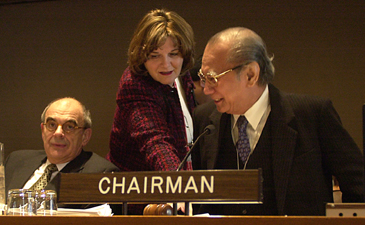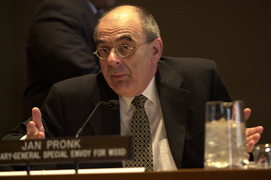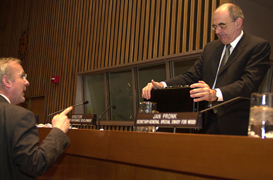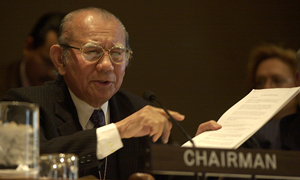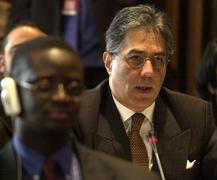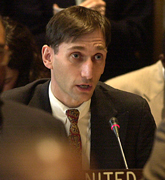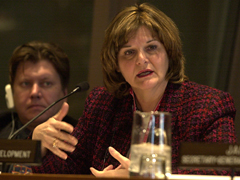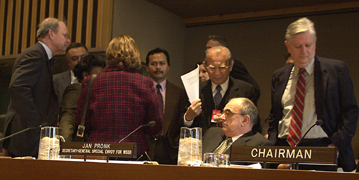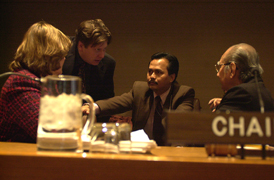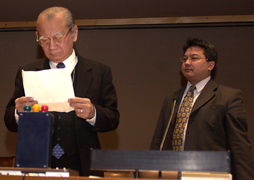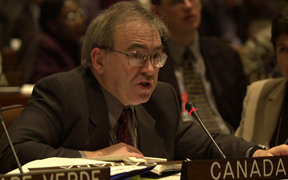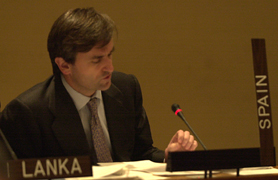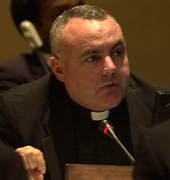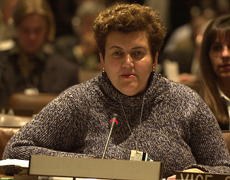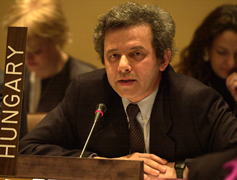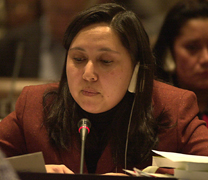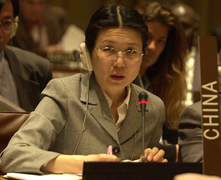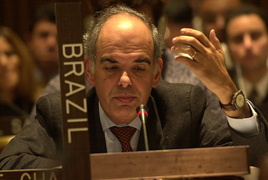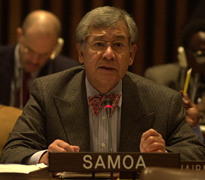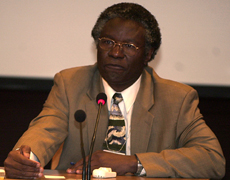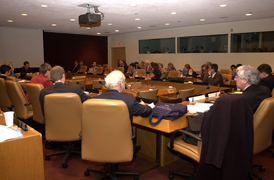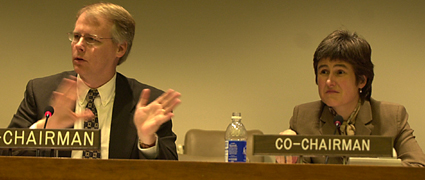|
Afternoon:
Opening of debate on Chair's List of Issues and Proposals
for Discussion
|
|
After consultations, it was decided that discussions
would be held in Plenary and not in two discussion groups.

Chair Salim deleted headings A through C, and proposes
that their grouping should be discussed and decided
upon once the substance has been addressed. He explained
once again the intent of the document as solely a basis
for discussion.
|
| |
 Richard Ballhorn, Canada, preferred discussing the
various clusters in two groups as it would be more time-efficient.
Regarding the issue of a multilateral agreement on global
corporate responsibility, he said this should be of a
voluntary nature, and that it is up to individual countries
to regulate corporations.
Richard Ballhorn, Canada, preferred discussing the
various clusters in two groups as it would be more time-efficient.
Regarding the issue of a multilateral agreement on global
corporate responsibility, he said this should be of a
voluntary nature, and that it is up to individual countries
to regulate corporations. |
|
|
|
Saudi
Arabia said the subheading on energy, transport and
protection of the atmosphere went beyond what was negotiated
in Rio. He said energy issues should be under poverty
eradication. |
| |
|
Zimbabwe, on behalf of the G-77/China, inter alia,
asked for clarification on the term "illicit crops,"
and for an additional paragraph on access to energy under
the poverty cluster. |
| |
 Spain, on behalf of the EU, raised four issues
of importance to the EU under the cluster of globalization
that need to be addressed: national action and governance;
trade; direct foreign investment; and international
and ecological governance. Regarding poverty eradication,
he emphasized sustainable urban development as well
as rural, and eradicating poverty through, inter
alia, markets and increased trade.
Spain, on behalf of the EU, raised four issues
of importance to the EU under the cluster of globalization
that need to be addressed: national action and governance;
trade; direct foreign investment; and international
and ecological governance. Regarding poverty eradication,
he emphasized sustainable urban development as well
as rural, and eradicating poverty through, inter
alia, markets and increased trade.
|
| |
|
The Holy See stressed the promotion and enhancement
of well-being through the promotion of access to basic
human services, and the strengthening of existing programmes
instead of launching new ones. |
| |
 The US said the Chair's list failed to state
that the poor are not poor because of globalization,
but because there is not enough of it. He stressed that
open markets drive development, opposed launching new
multilateral agreements, and supported better implementing
those that already exist. He also opposed more corporate
regulation.
The US said the Chair's list failed to state
that the poor are not poor because of globalization,
but because there is not enough of it. He stressed that
open markets drive development, opposed launching new
multilateral agreements, and supported better implementing
those that already exist. He also opposed more corporate
regulation.
|
|
|
|
 Brazil, speaking for the G-77/China, said the Group
appreciated the Chair's decision to eliminate the headings
in the Chair's document. She said the Group would still
prefer the distribution of work proposed by the G-77/China,
but would work based on the Chair's document.
Brazil, speaking for the G-77/China, said the Group
appreciated the Chair's decision to eliminate the headings
in the Chair's document. She said the Group would still
prefer the distribution of work proposed by the G-77/China,
but would work based on the Chair's document. |
| |
|
On
the issue of globalization, Hungary reiterated
the importance of the transboundary context and access
to information, and said the Aarhus Convention is an
important precedent. Regarding the Doha Development
Agenda, he urged mentioning synergies of the WTO process
with the Financing for Development and the WSSD.
|
|
|
|
 Chile, speaking for the G-77/China, said the
paragraph dealing with Information and Communication
Technologies (ICTs) was too limited, and lacked any
reference to technology transfer. She also stated that
the group did not feel comfortable with the reference
to the WTO playing a fuller role in making global decisions
on sustainable development.
Chile, speaking for the G-77/China, said the
paragraph dealing with Information and Communication
Technologies (ICTs) was too limited, and lacked any
reference to technology transfer. She also stated that
the group did not feel comfortable with the reference
to the WTO playing a fuller role in making global decisions
on sustainable development.
 Zimbabwe,
continuing for the G-77/China, stated that globalization
is not just about WTO and trade, but that it's also
about financing, labor flows and technology transfer;
and felt that the text should reflect this diversity
of meanings for globalization. Zimbabwe,
continuing for the G-77/China, stated that globalization
is not just about WTO and trade, but that it's also
about financing, labor flows and technology transfer;
and felt that the text should reflect this diversity
of meanings for globalization.
|
| |
|
China
said that if there is to be a multilateral agreement on
corporate accountability, domestic and transnational corporate
activities should be regulated. She also emphasized transfer
of financial and human resources, reduction of financial
risk, and strengthening market access of products from
developing countries. |
|
|
 Everton Vargas, Brazil, said the Chair's document
only highlights problems of developing countries and that
sustainability will not be a reality until the current
situation of developed countries is dealt with. He used
the example of greenhouse gas emissions, which have been
rising since 1992 despite international activities in
that area. He asked how the PrepCom will establish links
with decisions of, for example, the WTO Ministerial Conference
and the Monterrey Conference on Financing for Development,
and how they will be internalized.
Everton Vargas, Brazil, said the Chair's document
only highlights problems of developing countries and that
sustainability will not be a reality until the current
situation of developed countries is dealt with. He used
the example of greenhouse gas emissions, which have been
rising since 1992 despite international activities in
that area. He asked how the PrepCom will establish links
with decisions of, for example, the WTO Ministerial Conference
and the Monterrey Conference on Financing for Development,
and how they will be internalized. |
|
|
|
Samoa
supported the idea of corporate accountability and said
that global environmental reporting is an important element
of national governance. He also highlighted urban poverty,
and specified poverty of opportunities in education, jobs
and other benefits of society. He also said ecotourism
should be given more prominence. |
| |
 Japan
supported Canada's concern that dealing with the Chair's
text in one group and not two will make progress more
difficult. Concerning a paragraph on improving market
access for LDC products, he reminded delegates of a
previous commitment made in Brussels in 2001 that allows
for countries to consider effects on domestics producers.
Accordingly, he suggested changing the paragraph to
"improve preferential market access for LDCs by
working towards the objective of duty-free and quota-free
market access of LDC products." Japan
supported Canada's concern that dealing with the Chair's
text in one group and not two will make progress more
difficult. Concerning a paragraph on improving market
access for LDC products, he reminded delegates of a
previous commitment made in Brussels in 2001 that allows
for countries to consider effects on domestics producers.
Accordingly, he suggested changing the paragraph to
"improve preferential market access for LDCs by
working towards the objective of duty-free and quota-free
market access of LDC products." |
| |
|

